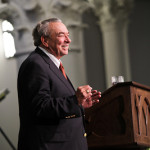 The following excerpt is taken from R.C. Sproul’s commentary on John.
The following excerpt is taken from R.C. Sproul’s commentary on John.
The doctrine of limited atonement (also known as “definite atonement” or “particular redemption”) says that the atonement of Christ was limited (in its scope and aim) to the elect; Jesus did not atone for the sins of everybody in the world. In my denomination, we examine young men going into the ministry, and invariably somebody will ask a student, “Do you believe in limited atonement?” The student will respond by saying, “Yes, I believe that the atonement of Christ is sufficient for all and efficient for some,” meaning the value of Christ’s death on the cross was great enough to cover all of the sins of every person that ever lived, but that it applies only to those who put their faith in Christ. However, that statement doesn’t get at the real heart of the controversy, which has to do with God’s purpose in the cross.
There are basically two ways in which to understand God’s eternal plan. One understanding is that, from all eternity, God had a desire to save as many people as possible out of the fallen human race, so He conceived a plan of redemption by which He would send His Son into the world as the sin-bearer for fallen people. Jesus would go to the cross and die for all who would at some point put their trust in him. So the plan was provisional—God provided atonement for all who take advantage of it, for all who believe. The idea is that Jesus died potentially for everybody, but that it is theoretically possible that the whole thing was in vain because every last person in the world might reject the work of Jesus and choose to remain dead in their trespasses and sins. Thus, God’s plan could be frustrated because nobody might take advantage of it. This is the prevailing view in the church today—that Jesus died for everybody provisionally. In the final analysis, whether salvation happens depends on each individual person.
The Reformed view understands God’s plan differently. It says that God, from all eternity, devised a plan that was not provisional. It was a plan “A” with no plan “B” to follow if it didn’t work. Under this plan, God decreed that He would save a certain number of people out of fallen humanity, people whom the Bible calls the elect. In order for that plan of election to work out in history, He sent His Son into the world with the specific aim and design to accomplish redemption for the elect. This was accomplished perfectly, without a drop of the blood of Christ being wasted. Everyone whom the Father chose for salvation will be saved through the atonement.
The implication of the non-Reformed view is that God doesn’t know in advance who is going to be saved. For this reason, there are theologians today saying, “God saves as many people as He possibly can.” How many people can God save? How many people does He have the power to save? If He is really God, He has the power to save all of them. How many people does He have the authority to save? Cannot God intervene in anyone’s life, just as He did in Moses’ life, Abraham’s life, or the apostle Paul’s life, to bring them into a saving relationship with Him? He certainly has the right to do that.
We cannot deny that the Bible speaks about Jesus dying for “the world.” John 3:16 is the premier example of a verse that uses this language. But there is a counterbalancing perspective in the New Testament, including John’s Gospel, that tells us Jesus laid down His life not for everyone but for His sheep. Here in John’s Gospel, Jesus speaks about His sheep as those whom the Father has given Him.
In John 6, we see that Jesus said, “No one can come to Me unless the Father who sent Me draws him” (v. 44a), and the word translated as “draws” properly means “compels.” Jesus also said in that chapter, “All that the Father gives Me will come to Me” (v. 37a). His point was that everyone whom the Father designed to come to His Son would come, and no one else. Thus, your salvation, from start to finish, rests on the sovereign decree of God, who decided, in His grace, to have mercy on you, not because of anything He saw in you that demanded it, but for the love of the Son. The only reason I can give under heaven why I’m a Christian is because I’m a gift of the Father to the Son, not because of anything I’ve ever done or could do.

